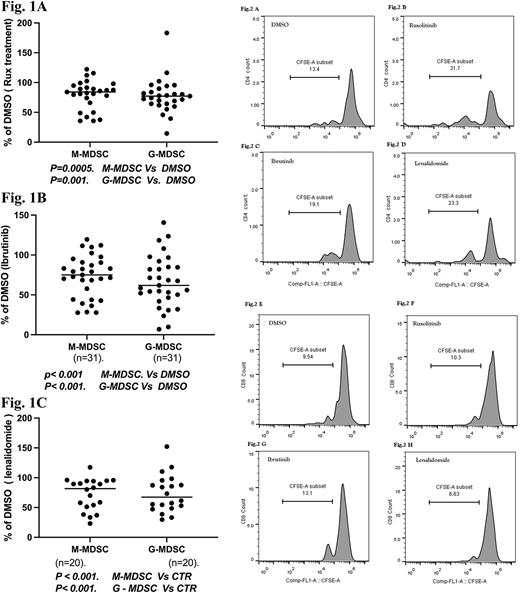Abstract
Although there has been much progress in the use of immune check-point inhibitor (ICI) therapy to treat cancers, very few studies have been published regarding the ICI therapy in Ph(-) myeloproliferative neoplasm (MPN). One clinical trial by Mascarenhas and his associates (ASH annual meeting 2020) in treating nine myelofibrosis patients with pembrolizumab was a anegative trial with no patients responded. Recent studies suggest a leading role for MDSCs in the immunosuppressive tumor micro-environments (TME) which could be the main cause of therapeutic resistance to ICI therapy. Therefore, we perform in vitro experiments to test some of potential drug to inhibit MDSC which may be added to the ICI therapy for future clinical ICI therapy in MPN.
Material & Methods: 1) in vitro culture for MDSC formation. Peripheral blood mononuclear cells (PBMC) were isolated from patients with ph(-) MPN by Ficoll Hypaque (GE Healthcare) density gradient centrifugation. Monocytes were isolated using CD14 MicroBeads (Miltenyi Biotec) and cultured in RPMI1640 media supplemented with 10% heat- inactivated FBS and 10 ng/mL IL-6 and GM-CSF (R&D Systems Inc) for 5 days. 2) Drug treatment. Where indicated, monocytes were treated with 0.01% DMSO or 1 umol/L each of Ibrutinib (in 0.01% DMSO), Ruxolitinib (in 0.01% DMSO). Lenalidomide (in 0.01% DMSO) for 1 hour every day during the MDSC cultures. 3) Flow cytometry: Cultured MDSC cells were subject for flow cytometric assessment on BD Accuri C6 flow cytometer. Monocytic MDCS was determined as HLA-DRdim/- and CD14+; guanulocytic MDCS as HLA-DRdim/-, CD14-, and CD33+, (BD Biosciences Inc). The flow data were processed using FlowJo vX. 4) T cell proliferation assay. T cells were isolated from a T4 or T8 isolation kits then T cells were labeled with carboxyfluorescein diacetate succinimidyl ester (CFSE; Life Technologies). T cells were nonspecifically activated with anti-CD3/CD28 beads (Life Technologies) and cocultured at 1:1 ratios of T cells to the MDSC obtained from in vitro culture, in the presence of 10 ng/mL IL2 (Invitrogen). After 3 days, T-cell proliferation levels (CFSE) in gated CD4+ and CD8+ cells was assessed respectively by flow cytometry. The flow data were processed using FlowJo vX.
Results: After 5 days cultures, Fig 1a ,b, c, shows Ruxolitinib, Ibrutinib, Lenalidomide significantly inhibits M-MDSC formation presented as (mean + SE ( % of DMSO )) of 79.72 + 4.66 ( n=27) , 73.19 + 4.71 (n=31), and 72.48 + 5.89 (n=20)respectively; Inhibits G-MDSC as of 77.82 + 5.66 (n=27) ,66.34 + 5.79 (n=31), (73.59 + 7.03) (n=20) respectively. Fig 2 showed CFSE levels in proliferated CD4+ (Fig. 2 A-D) and CD8+ (Fig.2 E-H) cells in a representative MF patient.
Conclusion: Ibrutinib, Ruxolitinib, Lenalidomide significantly inhibits MDSC formation in vitro in patients with MPN and improves T cell function. A further clinical trial to evaluate the combination of ICI therapy with MDSC inhibitor such as Ibrutinib , Ruxolitinib or Lenalidomide may be worthwhile in treating patients with Myelofibrosis.
Disclosures
No relevant conflicts of interest to declare.
Author notes
Asterisk with author names denotes non-ASH members.


This feature is available to Subscribers Only
Sign In or Create an Account Close Modal